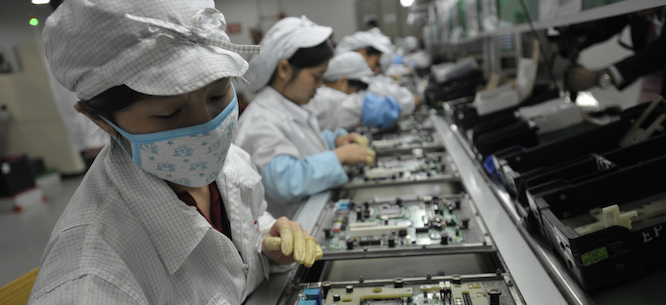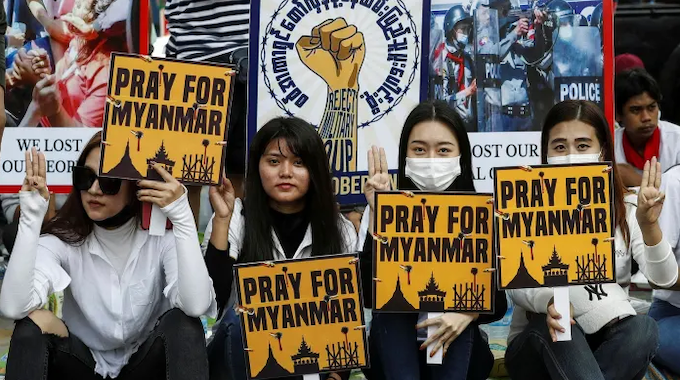On April 1 — appropriate date, perhaps, for a saga of unending western foolishness and villainy — the EU announced that officials from Iran, Russia, China, the UK, France, and Germany would be meeting virtually to discuss a possible return of the USA to the Joint Comprehensive Plan of Action (JCPOA). Later announcements indicated that representatives of both the USA and Iran would meet with European partners in Vienna in the first week of April, although possibly from different rooms to separate US and Iranian representatives. Talks began on August 6.
A State Department spokesman welcomed the move, indicating the Biden administration’s preparedness to return to the 2015 deal tortuously negotiated over several years between Iran, the US Obama administration and European powers, and that former President Donald Trump later unilaterally abrogated in May 2018. A pretense by the USA and Europe that resumption of JCPOA requires arduous negotiation camouflages the reality that it has always been obvious that removal of US sanctions on Iran would automatically prompt its immediate return to the JCPOA framework.
The use of the potential (but not the actuality) of nuclear weapons in the form of weapons development capability has arguably been an instrument of Iranian foreign diplomacy from the days of the Shah, first as a defense against nuclearization of regional neighbors and, since the Islamic revolution in 1979 — and in the guise of varying percentages of uranium enrichment and the construction of centrifuges (many unused) — against US and European opposition to Iranian independence from Washington.
The 2015 deal itself was the outcome of a long-standing, bullying, propaganda campaign by the USA, Israel, and Europe (UK, France, and Germany) to smear Iran’s peaceful nuclear energy program (including the slight enrichment of uranium for scientific and medical purposes, far below the 90%+ required for nuclear weaponry) as a meaningful threat of nuclear war. Yet Iran, a signatory in 1968 of the Treaty on Non-Proliferation of Nuclear Weapons (NPT), had over several decades conceded detailed scrutiny of its energy program (perfectly legitimate, under the NPT) to the International Atomic Energy Agency (IAEA). Israel, on the other hand, in possession of one hundred or more nuclear warheads, never signed the NPT.
Israel, with a far smaller population (9 million) than Iran (82 million) and a far smaller territory (22,145 sq.km to Iran’s 1,648,195 sq km), is and has consistently shown evidence of being by far the more likely nuclear aggressor in the Middle East. In June 1981, an Israeli airstrike destroyed an unfinished suspected Iraqi nuclear reactor located 17 kilometers southeast of Baghdad, Iraq. In 2007, Israel struck a suspected nuclear reactor in the Deir ez-Zor region of Syria. In the period 2009 to 2012 the Israeli administration of Benjamin Netanyahu several times threatened to attack Iranian nuclear facilities. In addition, the US and Israeli administrations collaborated in a cyberattack on Iranian facilities (“Stuxnet”) in 2009. There have been several assassinations of Iranian nuclear scientists – the latest reported in November 2020 – mostly attributed to Israel’s Mossad.
Through JCPOA, Iran — which has never possessed nuclear weapons and which has never formally revealed evidence of wanting or planning them — was cowered into conceding an implicit but false admission to being at fault in some way. Iran’s Supreme Leaders have consistently stated their belief that such weapons are immoral. Ayatollah Ali Khamenei, the Supreme Leader of Iran, confirmed a fatwa against the acquisition, development and use of nuclear weapons in October 2003. “Evidence” of Iranian scientists’ planning for nuclear weaponry is based on forgeries.
The bullying gang was a cabal of more prosperous nations that unlike Iran, did possess nuclear weapons and, in the case of the USA, had actually used them and, from time to time, demonstrated continuing willingness to consider their use.
Furthermore, Washington has never shown a fraction of the hysteria it regularly performs on account of Iran’s (non-existent) nuclear “threat” as it did with the actual nuclear weaponization of India from 1998 (with possibly 150 nuclear warheads today) and Pakistan in 1972.
Iran’s misleading concession to the West’s false narrative was the product of Western coercion through sanctions’ regimes. US-driven sanctions’ terror over Iran, both primary (involving relations between Iran and U.S. actors) and secondary (involving relations between Iran and non-U.S. actors), started from the early 1980s and extended in 1995 to cover bilateral trade and foreign investment in Iranian oil and gas development. Sanctions were further extended in 2002 to include nuclear and missile technology, financial services, transportation, foreign banks operating in Iran, and purchase of Iranian oil. Although many sanctions were lifted by JCPOA, others were retained, including Iranian support for terrorism, development of ballistic missiles, arms-related transactions, violations of human rights and corruption. The slipperiness of concepts such as “terrorism,” “human rights,” and “corruption” in the hands of U.S. and allied states and state-compliant “NGO” agencies provides ample room for continuing sanctions aggression on false or misleading pretext. This is particularly worrisome in the contexts of covert and proxy wars between the US, European powers, Gulf States, Israel, and Salafist rebels in Syria, on the one hand and, on the other, the Syrian government, Russia, and Iranian-backed Hezbollah, as also in the case of Iranian support for the Houthis in Yemen. Even a return to JCPOA, therefore, would exercise considerable restraint on Iranian exercise of its legitimate, sovereign power.
Iran’s peaceful nuclear energy program originated from imperial machinations in Iran. It was launched in 1957 with US and European assistance in the administration of Mohammad Reza Pahlavi, Shah of Iran, in the wake of the US-UK orchestrated coup d’etat of 1953 that toppled democratically elected prime minister Mohammad Mossadegh. The program continued until the 1979 Iranian Revolution. The Shah approved plans to construct up to 23 nuclear power stations by 2000. It is possible that the Shah always entertained the possibility of transitioning from a nuclear energy to a nuclear weapons program should neighboring states do the same. The USA supplied the country with a reactor fueled by highly enriched uranium in 1967. After a two-year hiatus, the Shah’s program was resumed by the revolutionary administration in 1981. The regime intended to continue collaborating with a French-owned consortium, but France succumbed to pressure from the Reagan administration in 1984 to end all nuclear cooperation with Iran, despite the absence of any evidence for US claims that Iran’s then only reactor presented a risk of proliferation. In the 1990s, Russia formed a joint research organization with Iran, providing Iran with Russian nuclear experts and technical information.
Sanctions have a negative impact on the Iranian economy and the welfare of its people. The value of Iranian petroleum exports fell from $53 billion in 2016-2017 to $9 billion in 2019-2020. Iranian GDP shrank by between 5% and 6.5% each year in the period 2018-2020, and inflation rose each year between 30% and 41%. The value of the Iranian currency, the rial, fell from 64,500 rials to the dollar in May 2018 to 315,000 to the dollar in October 2020.
As strategies of control, sanctions have significant other weaknesses, even from the western point of view. Since the revolution of 1979, first, there is a clear correlation between western aggression towards Iran and the influence on the Iranian polity of anti-western Iranian conservatives and their control over Iranian society through the clerical hierarchy and its exercise of superordinate power over Iran’s parliamentary democracy by the Office of the (non-elected) Supreme Leader, the Council of Guardians, the religious foundations (or bonyads) and Revolutionary Guards. Second, sanctions encourage Iranian strategies of import substitution and technological independence. Third, they help consolidate Iran’s relations with global powers that rival Washington, including Russia and China, and its relations with sympathetic powers in the region, including Syria, Lebanon, and Iraq. In March 2021 Iran and China agreed a deal whereby China would invest $400 billion in Iran over 25 years in exchange for a steady supply of oil to fuel. The deal represented a further incursion of Chinese influence in the Middle East (extending to an offer by China to broker peace between Israel and Palestine) at the likely expense of the USA, promising further escalation of tensions between China and the USA and the ultimate threat of nuclear war.
Oliver Boyd-Barrett is Professor Emeritus of Bowling Green State University, Ohio. He is a scholar of international media, news, and war propaganda.
Read other articles by Oliver.
This article was posted on Thursday, April 8th, 2021 at 6:46pm and is filed under China, Europe, France, Germany, Iran, Israel, Joe Biden, Nukes, Opinion, Russia, Sanctions, United Kingdom.
This post was originally published on Radio Free.





